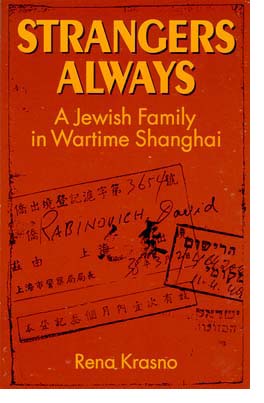Rena Krasno, now 84, was born and raised in Shanghai in the once-flourishing Jewish community. She's back in town to launch the Chinese translation of her book about a Jewish family in wartime, writes Nancy Zhang.
Foreigners come and go in Shanghai, some staying for a few years, some just for a couple days.
For most expats, this city is but a temporary posting, but since the 19th century Jews have been making Shanghai their home. Rena Krasno is one of those who was born and raised in Shanghai.
Born to Jewish Russian immigrants in 1923, Krasno lived through World War II and the War of Resistance Against Japanese Aggression (1937-45) and has written several books on her experiences.
Now the author, public speaker and cultural ambassador is back this week in her birthplace to launch the Chinese translation of her book on Sunday and to share her many memories. It's the second trip back for the resident of Mountain View, California, the United States. The first was in 1998.
The book is
Strangers Always: A Jewish Family in Wartime Shanghai, compiled from her teenage diaries and providing a rich and detailed account of life in the local Jewish community.
Meeting 84-year-old Krasno is like having a taste of old Shanghai. Entering her Donghu Road apartment is like stepping into a perfectly preserved enclave of turn-of-the-century Europe - the apartment was designed by Krasno's uncle in the 1930s.
Purely by coincidence she had become friends with its present owner - but then, "if you've lived as long as I have," she says smiling. "life is full of coincidences."
In fact everywhere in this city, its history intertwines with hers. Krasno's uncle designed the Ohel Moishe Synagogue, one of two remaining historical synagogues in Shanghai. Once, on Xiangshan Road her father met Dr Sun Yat-sen, forerunner of the Chinese democratic movement and founder of the Republic of China. At Moganshan Mountain resort in the neighboring Zhejiang Province still stands the Russian villa where she used to spend holidays.
But being an immigrant and a Jew in those times meant struggle and a certain rootlessness. "Unlike the French or Germans, as white Russians we had nothing, no money. As Jews in those days we even had no country, no passport," Krasno reminisces.
Rootlessness has also stamped the rest of her life. Since leaving Shanghai at the age of 24, she has lived in seven countries. She can speak six languages and was a UNESCO simultaneous interpreter (four languages), international charity worker, and now cultural ambassador through her books and lectures: Krasno has worn many hats.
Shanghai, however, is a theme she can't help but return to. Of nine books she has written, most have been about Shanghai. Strangers Always has been translated into Chinese for the first time.
Her stories of wartime Shanghai reflect the darkness of those times, yet remarkably they're also all about hope. Her favorite anecdote occurred in Fuxing Park during the Japanese occupation: A sudden bomb raid forced three people of different nationalities together.
"There we were a Japanese, a Westerner and a Chinese hiding together from the bomb raid, just helping each other," she recalls. She also talks about Jewish and Chinese people helping each other in the refugee camps though both sides were very poor. She herself was not in a camp.
Having lived through an era of so much hatred, she yet says, "Young people don't hate each other. We cannot judge people, because there are so many things in their hearts we can never guess."
Speaking of her impressions on her first trip back to the city, she says, "I wanted to kiss the ground. I thought, 'My god! This is a different China'." This is also the reason she wants to come back a second time.
"I want to talk to children in schools, like I am talking to you now, like a grandma to her family," she says. "I want to tell them how things used to be. China did not just get richer, it has changed completely. "You must realize how lucky you are," she says, looking directly into my eyes.
As she speaks, she unconsciously refers to the streets and landmarks by their old names: Rue de Moliere, the French Park, and the Aurora University (Xiangshan Road, Fuxing Park and Shanghai No. 2 Medical University respectively).
It is as if Shanghai's modernity is being rubbed off layer by layer. "When I walk there, I don't see the new things," she says. "I'm still me."
Krasno will be signing the Chinese translation of her book Strangers Always on Sunday at the San Lian Book Store, later speaking at the Glamour Bar in M on the Bund.
(Shanghai Daily October 29, 2007)


